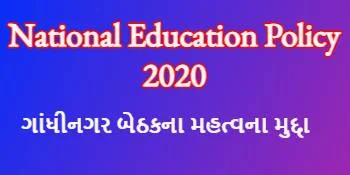Meeting Topics Regarding National Education Policy 2020
Respect the beginning of the meeting. This was done by the Secretary's statement, in which he asked the members to discuss the issues for the decision to be taken by the state level in the main meeting. The member member secretary of the committee Dr. TS Joshi with the permission of the chairman made a presentation on the issues suggested by the members of the Yask Force regarding the national education policy. At the end of the adult discussion in the meeting, it was unanimously agreed on the decisions to be taken by the state level regarding the implementation of NEP. The details of the decisions taken by the YASK Force, the implementation of which is the year 2021-22, are given below;
1) According to NEP 2020, this policy covering the age of 3 years to 18 years has changed the existing structure of school education of 10 + 2 and recommended new 5 + 3 + 3 + 4 educational and curriculum related structures. In this regard, it is suggested to accept the innovative structures suggested by the Task Force Committee. Hence, the decision is taken to implement the following school structure in the state. The school structure proposed in National Education Policy 2020 will be 3 + 3 + 4, in which,… a) 5 years of pre-primary in 5 years and Std. 1 and 2 (basic education) b) 2 years Std. 6 to 8 (elementary education) c) 3 years Std. 6 to 8 (Upper Primary Education) d) 4 years Std. 9 to 12 Secondary Education), (Implementation - Education Department) 2) With reference to the above issues
(1) (a). According to the school structure 53 + 3 + 4 ... a) The first five years (i.e. the first two years of the basic stage from the age of 3+ years of the child's age will be in Anganwadi / Pre-Primary,
b) When the next year (from 5+ years of age of the child) (year before standard 1) will be known as 'Kindergarten'. Is when the standard will be started from the age of 6+ years of the child. 4) This structure will be implemented from the academic year 2021-22. e) To ensure admission of children who have completed 3 years to get admission in pre-primary / anganwadi. Along with this, Anganwadi system should also be set up in the ashram schools located in the tribal areas of the state. Implementation - Department of Education, Department of Women and Child Development, Department of Tribal Development) a) Kindergarten children will be given activities like Pragya approach like Std. 1 and 2.
b) Contract based recruitment will be done by outsourcing by Gujarat Primary Education Council as per your requirement for kindergarten.
c) At least PTC / D.El.Ed of the teacher appointed in the kindergarten. Should be qualified. (Implementation - Department of Education, Department of Women and Child Development, Office of the whole Education)
4) With regard to the above issue (I) From 12 to four consecutive years should be done. (Implementation - Department of Education, Board of Secondary and Higher Secondary Education)
5) The State School Standards Authority (SSSA) will work in coordination with the State School Standards Authority (SSSA) GCERT to ensure compliance with the required vocational and quality standards in all pre-primary to higher secondary education institutions in the state, including public, private and aided, as per NEP 2020. Implementation - Department of Education)
6) The State Preprimary Regulatory Body is to be constituted for the regulation of pre-primary institutions in the State, which is directed by the Director, ICDS. Standards for accrediting all types of pre-primary institutions in the state in coordination with | Prepares and implements standards. (Implementation - Department of Women and Child Development, Department of Education) Accordingly, GCERT provides training and certification in this regard in collaboration with the Department of Women and Child Development and Children's University to prepare a new syllabus considering the syllabus prepared by NCERT for the above trainings. (Implementation GCERT, Children's University, Department of Women and Child Development) a) To merge a school with a number of less than 60 as per the provisions of RTE Act and a school of 1st to 5th standard with a higher number of standard 1 to 5 schools within a radius of 1 km of 4/8 schools. b) Merge a school with a standard of 6 to 8 running and a school with less than 45 students within a 3 km radius of another school with a higher number of standard 6 to 8.








.jpeg)





0 Comments